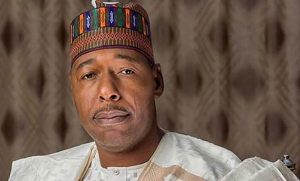Gov. Babagana Zulum of Borno State has announced plans to plant 10 million tree seedlings to combat desertification and conserve the ecosystem.

Zulum said this on Tuesday, August 6, 2024, during the inauguration of the 2024 Tree Planting Campaign at Kawuri community in Konduga Local Government Area of the state.
He directed the local government councils to establish shelter belts in their respective areas, and enjoined traditional leaders and communities to support the state government’s desert control programme.
While reiterating commitment to partner with the World Bank supported Agro-Climatic Resilience in Semi-Arid Landscapes (ACReSAL), Zulum directed the state Ministry of Environment and other agencies, to ensure the survival of the trees planted.
He also directed the Secretary to the State Government to liaise with the State House Assembly, to fast track review of exxtant environmental laws.
The governor said that his administration had procured electric vehicles and gas cylinders for distribution to deserving communities as part of measures to control desertification in the state.
According to Zulum, the establishment of the state’s agency for the Great Green Wall, will address desertification and othe environmental challenges.
The Commissioner for Environment, Mohammed Kois, said the ministry had earmarked tree seedlings for distribution, and urged residents of the state to plant trees to enhance the campaign against desertification.
Also speaking, Mr Saleh Abubakar, the Director-General, National Agency for the Great Green Wall (NAGGW), said that Borno was the first state to domesticate the GGW Act.
Represented by Habiba Usman, Director of Planning and Policy Coordination in the agency, pledged sustained support in the fight against desertification in the state.
“Thus, the NAGGW is glad to be part of the tree planting campaign, as this not only complement the agency’s interventions, but also shows the Borno State Government’s commitment to addressing environmental challenges associated with land degradation and climate change,” he said.
By Yakubu Uba
